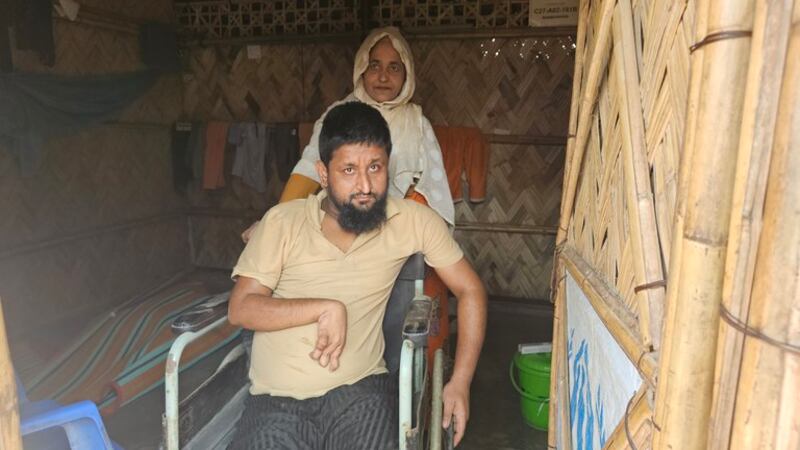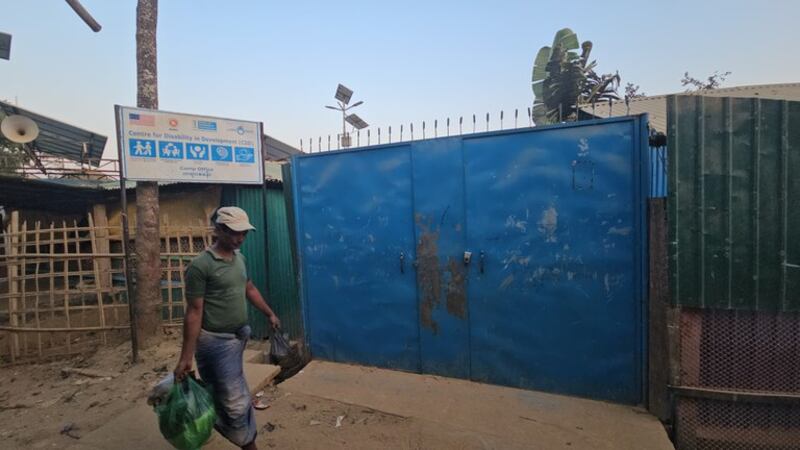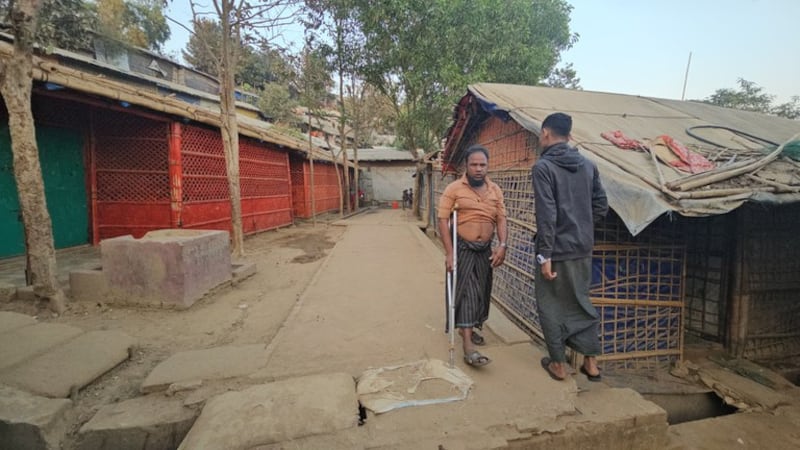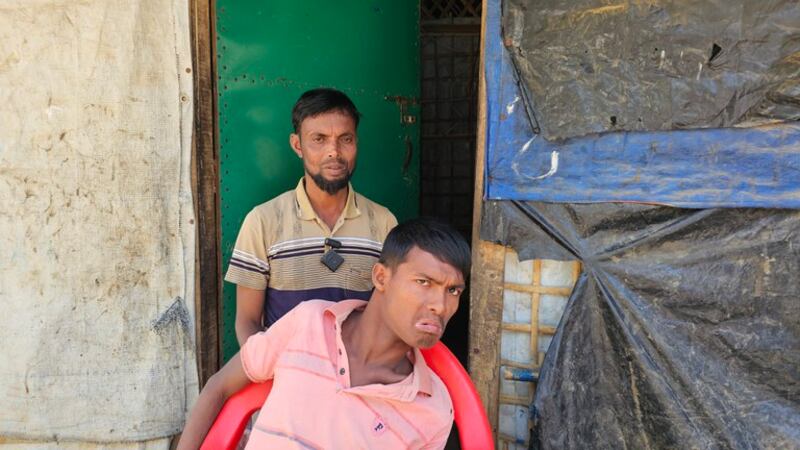UPDATED at 8:00 A.M. ET on 02-20-2025
DHAKA/COX’S BAZAR, Bangladesh - At a Rohingya refugee camp in southeastern Bangladesh, Mohammed Hasan cast doubt over whether he’d ever walk again.
The 40-year-old had a leg amputated after a Burmese soldier shot him during the Myanmar military’s deadly crackdown against the stateless Rohingya Muslim minority in 2017. Hasan’s other leg was paralyzed after the shooting.
Like hundreds of thousands of his fellow Rohingya, he fled that year from his home in Rakhine state to neighboring Bangladesh. There, a nongovernmental organization helped him with medical treatment, including physiotherapy.
But all that is gone now.
“Physiotherapy and other treatments at Handicap International revived my hope for being able to stand up again. But Handicap International ceased their operations, blowing my hopes,” Hasan told BenarNews this month.
More than a dozen healthcare facilities that help Rohingya refugees have suspended operations in the past few weeks, leaving thousands without essential health services and exacerbating already dire conditions at sprawling camps in Cox’s Bazar district near the Myanmar border.
Some Bangladeshi officials have attributed the closures to a decision last month by the new U.S. administration to freeze foreign aid for 90 days, pending a review of foreign assistance programs.
Bangladeshi officials say the decision by the United States – the world’s largest single aid donor, according to the United Nations – has affected various services helping the Rohingya refugees in Bangladesh, including health, water and sanitation, education, and livelihood.
In a filing with the U.S. District Court in the District of Columbia on Feb. 18, the Trump administration said it would not release its foreign aid funds despite a federal judge’s order last week to lift its freeze, according to a copy of the court document seen by BenarNews.
Three facilities run by the global nonprofit International Rescue Committee (IRC) have completely shut down while two others could stop operations by the end of March, an official of a Bangladeshi government agency overseeing the needs of refugees told BenarNews last week.
“Apart from that, around 14 [Centre for Disability in Development, or CDD facilities] across the camps ceased their operations following the U.S. fund freeze that also laid off many healthcare staff,” Refugee, Relief and Repatriation (RRR) Commissioner Mohammed Mizanur Rahman said.
BenarNews visited five CDD facilities in Cox’s Bazar and found they had stopped their operations at present.

A medical officer working at a government hospital also told BenarNews that the health aid group Handicap International – which used to provide medical care for refugees such as Mohammed Hasan – had stopped its operations.
RELATED STORIES
Trump aid freeze is opportunity to revamp US programs in Bangladesh
Rubio allows humanitarian aid as Dhaka claims Rohingya funding will continue
Q&A: Researcher finds hunger, desperation among newest Rohingya refugees
More than a million refugees
Another health research group, the International Centre for Diarrhoeal Disease Research, Bangladesh (ICDDR, B), had also suspended its operations to help the refugees, said Enamul Haque, a medical officer at the government-owned Teknaf Upzila Health Complex.
“With these two centers shut down, patients are facing extreme difficulties. There is no other hospital except for the government hospital,” Enamul told BenarNews on Feb. 11.
“In reality, there is nowhere for these patients to go … [P]oor patients are suffering the most,” he said.
BenarNews tried to contact five organizations that had allegedly suspended their operations following the freeze on foreign aid implemented by the Trump administration, which took office on Jan. 20.
Among the groups, IRC did not respond to multiple requests from BenarNews. Local officials with Handicap International, CDD, and the U.N. refugee agency UNHCR declined comment.
ICDDR, B denied it had activities affected by the funding freeze.
“The claim that our operations to help Rohingya refugees have completely ceased is not accurate, as we did not have any activity there with the funding in question,” ICDDR, B Development and Communications Manager A.K.M. Tariful Islam Khan told BenarNews in an email on Wednesday.

More than 1 million Rohingya refugees are staying in camps in and around Cox’s Bazar – some of the largest and most densely populated refugee shelters in the world.
There are 120 healthcare centers across 34 camps that often provide medical care for at least 70,000 Rohingya refugees, Mizanur, the RRR commissioner, said.
“As the U.S. is the biggest funder [of foreign aid in Bangladesh], the fallout of the aid freeze could impact other medical facilities too in the [camps],” he said.
An official involved with healthcare services in the camps said on Feb. 11 that the existing healthcare facilities for the refugees had scaled down their services by as much as 25% since the U.S. funding was paused.
“We have observed service disruptions in the Rohingya refugee camps as well as in the host communities, including in life-saving interventions,” Syed Md Tafhim, a communications officer at the Inter Sector Coordination Group (ISCG), said in a statement.
The ISCG serves as the international central coordination body for humanitarian agencies that serve Rohingya refugees in Cox’s Bazar.

Affected services range across different sectors, such as health (including treatment for persons with disabilities), water and sanitation, education, and livelihood, the group said.
“As a result of this global pause, preliminary information suggests that several important projects benefitting Rohingya refugees and Bangladeshi host communities have had to be suspended, interrupting some essential and life-saving services,” the ISCG said.
“While some exceptions and waivers are gradually being communicated by the U.S. Government, we do not yet have a detailed understanding of how this may affect specific programmes in the Rohingya response in the short and medium term,” it also said.
According to the United Nations Population Fund (UNFPA), the pause in funding would “invariably affect” its Rohingya refugee response.
“The United States has been among our steady partners to the Rohingya response, and we remain both grateful and hopeful that funding support will soon resume to ensure refugee women and girls and those from the host community continue to receive critical assistance to uphold their health, safety, and dignity in Bangladesh,” UNFPA Bangladesh Representative Masaki Watabe said in a statement.
Anxious parent
Back in the refugee camps, a Rohingya father waits.
In their small hut made of bamboo and tarpaulin at Camp 16, Kabir Hossen lives with his son, Md Hasan, who has a paralyzed leg and struggles with a form of palsy.

Every 10 days, they used to visit a CDD facility for his treatment and medicine. But on Feb. 1, the center’s staff turned them away, saying they already stopped providing services.
“I don’t know where to avail the treatment for my son,” Hossen, 47, told BenarNews.
“Uncertainty is gripping me.”
The story has been updated to include the comment of ICDDR, B Development and Communications Manager A.K.M. Tariful Islam Khan.
BenarNews is an RFA-affiliated news organization.
